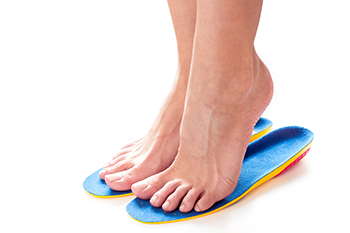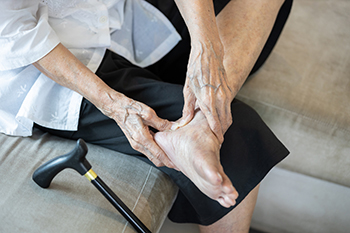Items filtered by date: April 2022
How You Can Protect Your Limbs as a Diabetic
While complications of diabetes, such as poor circulation and neuropathy, can make a wound easier to develop and harder to detect and heal, there are many preventative measures you and your podiatrist can take to reduce your risk of amputation. On your end, make foot care a priority. Wear shoes and socks that fit well and don’t rub against any part of your feet or cut off circulation. Avoid walking barefoot. Elevate your feet and wiggle your toes frequently to keep the blood flowing. Eat a balanced diet and exercise to help manage your sugar levels and maintain a healthy body weight. Don’t smoke. Inspect your feet twice a day, using a mirror if needed, to see the bottom of your feet. Get to your podiatrist right away if you spot anything unusual. Early recognition/treatment of a problem can greatly reduce your risk of amputation. Some wounds may be avoided by getting regular foot screenings and having a podiatrist trim your toenails and treat any corns or calluses. They may also prescribe diabetic shoes and create custom orthotics to prevent foot injuries. If a wound does develop, your podiatrist can dress your wound appropriately, remove dead skin and tissue (debridement), reduce pressure and friction on the wound, and help restore adequate blood flow. They can also advise you on how to properly care for your wound at home. In cases where a higher level of wound care is necessary, your podiatrist may be able to use skin or bone grafts, or perform reconstructive surgery to replace or rebuild infected or necrotic bones, tendons and tissue.
Limb salvage can be an effective way in preventing the need for limb amputation. If you have diabetes, cancer, or any other condition that could lead to foot amputation if left unchecked, consult with Dr. Steven Sheridan from Ankle & Foot Specialty Clinics. Our doctor will assess your condition and provide you with quality foot and ankle treatment.
What Is Limb Salvage?
Limb salvage is the attempt of saving a limb, such as the foot from amputation. Podiatrists also try to make sure that there is enough function in the foot after the salvage that it is still usable. Diabetes is the number one cause of non-traumatic amputations in the United States. Those with diabetes experience poor blood circulation, which prevents proper healing of an ulcer. If the ulcer is left uncheck, it could become infected, which could result in the need for amputation.
However, there are other causes as well, such as cancer and traumatic injury. Links between higher mortality rates and amputation have been found. This translates into higher healthcare costs, and a reduced quality of life and mobility for amputees. Podiatrists have attempted to increase the prevalence of limb salvage in an attempt to solve these issues.
Diagnosis and Treatment
Limb salvage teams have grown in recent years that utilize a number of different treatments to save the infected limb. This includes podiatrists that specialize in wound care, rehabilitation, orthotics, and surgery. Through a combination of these methods, limb salvage has been found to be an effective treatment for infected limbs, and as an alternative to amputation. Podiatrists will first evaluate the potential for limb salvage and determine if the limb can be saved or must be amputated.
If you have any questions, please feel free to contact our office located in Sandusky, MI . We offer the newest diagnostic and treatment technologies for all your foot care needs.
Are Orthotics Right for You?
Orthotics are shoe or heel inserts that can be custom made by a podiatrist if you are having foot, leg, or back pain. Orthotics are generally used to help correct foot abnormalities, ease pain in feet and ankles, and reduce the risk of injury. Continued heel and foot pain are customary complaints that are diagnosed and can lead to a trial use of orthotics. A podiatrist will usually examine your feet, ask you to walk and perform movements to look at how your feet and ankles are positioned and how the feet strike the ground, and possibly order further imaging, such as an X-ray or MRI to help them identify problem areas. Arthritis, lack of cushioning, bunions, bursitis, flat feet, and hammertoes are all examples of conditions that orthotics might help. Though you can buy over-the-counter foot pads, do home exercises, and/or try nonsteroidal anti-inflammatory drugs (NSAIDS) to try and help with pain and associated problems, you might be prescribed orthotics if these do not help. It is suggested that you visit a podiatrist for any issues that cause discomfort that might be related to your feet for proper diagnosis and treatment.
If you are having discomfort in your feet and would like to try orthotics, contact Dr. Steven Sheridan from Ankle & Foot Specialty Clinics. Our doctor can provide the care you need to keep you pain-free and on your feet.
What Are Orthotics?
Orthotics are inserts you can place into your shoes to help with a variety of foot problems such as flat feet or foot pain. Orthotics provide relief and comfort for minor foot and heel pain but can’t correct serious biomechanical problems in your feet.
Over-the-Counter Inserts
Orthotics come in a wide variety of over-the-counter inserts that are used to treat foot pain, heel pain, and minor problems. For example, arch supports can be inserted into your shoes to help correct overarched or flat feet, while gel insoles are often used because they provide comfort and relief from foot and heel pain by alleviating pressure.
Prescription Orthotics
If over-the-counter inserts don’t work for you or if you have a more severe foot concern, it is possible to have your podiatrist prescribe custom orthotics. These high-quality inserts are designed to treat problems such as abnormal motion, plantar fasciitis, and severe forms of heel pain. They can even be used to help patients suffering from diabetes by treating foot ulcers and painful calluses and are usually molded to your feet individually, which allows them to provide full support and comfort.
If you are experiencing minor to severe foot or heel pain, it’s recommended to speak with your podiatrist about the possibilities of using orthotics. A podiatrist can determine which type of orthotic is right for you and allow you to take the first steps towards being pain-free.
If you have any questions please contact our office located in Sandusky, MI . We offer the newest diagnostic and treatment technologies for all your foot and ankle needs.
Four Ways Diabetics Can Take Care of Their Feet
Diabetes can reduce blood flow and decrease your body’s ability to heal. Both complications can lead to, and exacerbate, foot problems, which makes it vitally important for diabetics to take care of their feet. The following four measures are basic, yet very effective as part of a daily diabetic foot care regimen. 1) Perform a thorough daily inspection of your feet to check for any injuries that may have developed such as cuts, scrapes, blisters, bruises, swelling, changes in skin color, and more. If you notice anything unusual, make an appointment with your podiatrist right away. 2) Take care of the skin on your feet to avoid any infections or cracked skin. Wash and dry your feet every day and keep them moisturized—taking care to keep the area between your toes dry and free from lotion. 3) Your feet should always be covered when you are walking to keep them protected from injury. Wear slippers around the house, and your socks should never be tight. 4) Keep the blood flowing in your feet by elevating them whenever possible and wiggling them for a few minutes throughout the day. If you have diabetes, see your podiatrist for regular checkups. They can ensure that your feet are staying healthy and offer you professional foot care advice.
Diabetic foot care is important in preventing foot ailments such as ulcers. If you are suffering from diabetes or have any other concerns about your feet, contact Dr. Steven Sheridan from Ankle & Foot Specialty Clinics. Our doctor can provide the care you need to keep you pain-free and on your feet.
Diabetic Foot Care
Diabetes affects millions of people every year. The condition can damage blood vessels in many parts of the body, especially the feet. Because of this, taking care of your feet is essential if you have diabetes, and having a podiatrist help monitor your foot health is highly recommended.
The Importance of Caring for Your Feet
- Routinely inspect your feet for bruises or sores.
- Wear socks that fit your feet comfortably.
- Wear comfortable shoes that provide adequate support.
Patients with diabetes should have their doctor monitor their blood levels, as blood sugar levels play such a huge role in diabetic care. Monitoring these levels on a regular basis is highly advised.
It is always best to inform your healthcare professional of any concerns you may have regarding your feet, especially for diabetic patients. Early treatment and routine foot examinations are keys to maintaining proper health, especially because severe complications can arise if proper treatment is not applied.
If you have any questions please feel free to contact our office located in Sandusky, MI . We offer the newest diagnostic and treatment technologies for all your foot and ankle needs.
Wounds That Don't Heal Need to Be Checked
When Your Feet Sweat Excessively
 “Hyperhidrosis,” or excessive sweating, can impact the feet. Feet can sweat for a variety of reasons, such as heat, vigorous exercise, pregnancy, shoes that do not fit properly, stress, overuse of feet, side effects of certain medications, or an underlying medical condition like diabetes or thyroid disease. When foot sweat is not cleaned up it can get trapped between toes, which can allow bacteria to grow and enter a cut or ingrown toenail, become infected, and lead to smelly feet (also known as “Bromodosis”). It makes good sense to wash and dry the feet regularly, as well as to wear proper footwear. Additional at home remedies can include foot powders and antiperspirants or medicated insoles. People more apt to develop these types of foot infections are seniors, diabetics, those undergoing hormonal changes (like in pregnancy), and those with compromised immune systems. Such infections must be tended to immediately. If your feet continue to sweat and smell and regular foot hygiene measures do not solve the problem, or if you notice an infection festering, a visit to a podiatrist is suggested for proper diagnosis, a better understanding of the root cause of the problem, and more aggressive treatment.
“Hyperhidrosis,” or excessive sweating, can impact the feet. Feet can sweat for a variety of reasons, such as heat, vigorous exercise, pregnancy, shoes that do not fit properly, stress, overuse of feet, side effects of certain medications, or an underlying medical condition like diabetes or thyroid disease. When foot sweat is not cleaned up it can get trapped between toes, which can allow bacteria to grow and enter a cut or ingrown toenail, become infected, and lead to smelly feet (also known as “Bromodosis”). It makes good sense to wash and dry the feet regularly, as well as to wear proper footwear. Additional at home remedies can include foot powders and antiperspirants or medicated insoles. People more apt to develop these types of foot infections are seniors, diabetics, those undergoing hormonal changes (like in pregnancy), and those with compromised immune systems. Such infections must be tended to immediately. If your feet continue to sweat and smell and regular foot hygiene measures do not solve the problem, or if you notice an infection festering, a visit to a podiatrist is suggested for proper diagnosis, a better understanding of the root cause of the problem, and more aggressive treatment.
If you are suffering from hyperhidrosis contact Dr. Steven Sheridan of Ankle & Foot Specialty Clinics. Our doctor can provide the care you need to attend to all of your foot and ankle needs.
Hyperhidrosis of the Feet
Hyperhidrosis is a rare disorder that can cause people to have excessive sweating of their feet. This can usually occur all on its own without rigorous activity involved. People who suffer from hyperhidrosis may also experience sweaty palms.
Although it is said that sweating is a healthy process meant to cool down the body temperature and to maintain a proper internal temperature, hyperhidrosis may prove to be a huge hindrance on a person’s everyday life.
Plantar hyperhidrosis is considered to be the main form of hyperhidrosis. Secondary hyperhidrosis can refer to sweating that occurs in areas other than the feet or hands and armpits. Often this may be a sign of it being related to another medical condition such as menopause, hyperthyroidism and even Parkinson’s disease.
In order to alleviate this condition, it is important to see your doctor so that they may prescribe the necessary medications so that you can begin to live a normal life again. If this is left untreated, it is said that it will persist throughout an individual’s life.
A last resort approach would be surgery, but it is best to speak with your doctor to find out what may be the best treatment for you.
If you have any questions please feel free to contact our office located in Sandusky, MI . We offer the newest diagnostic and treatment technologies for all your foot and ankle needs.




